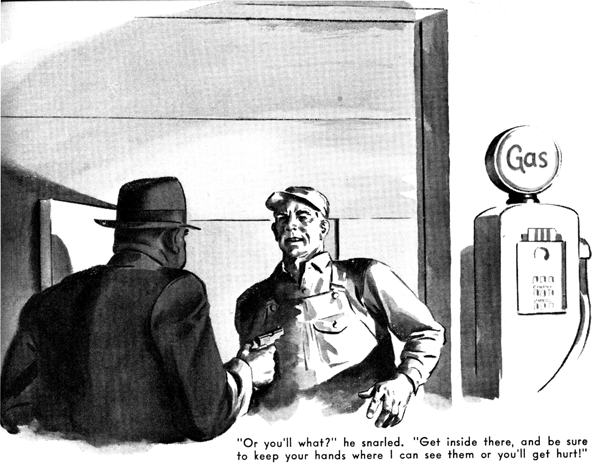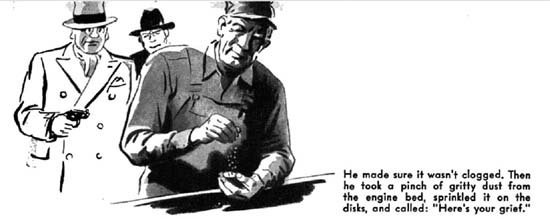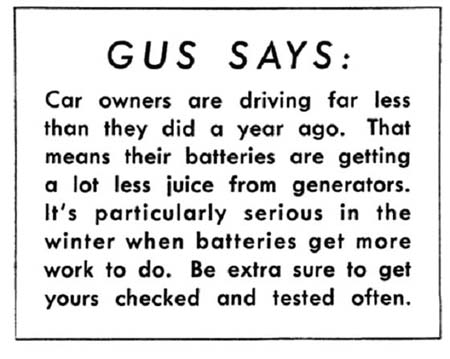December 1942
GUS NEVER FORGETS A CAR
by Martin Bunn
The Way Most of Us Remember Faces,
the Model Garage Proprietor Remembers Cars -
Once He's Worked on Them.
It always makes Gus Wilson smile when he hears anyone say that he can't tell his own car from another of the same make and model. Once Gus has worked on a bus he never forgets it. When we ask him how he remembers all of them that come into the Model Garage shop he grins and says: "Oh, I dunno. I just know 'em same as we know people."
Not a very lucid explanation, perhaps, but it's the only one we've been able to pry out of him.
However he does it, Gus's ability to remember cars came in very handy not long ago. Since the war started he has fallen into the habit -- his partner Joe Clark calls it a bad habit -- of working in his shop almost every evening. One night when he heard a horn honk outside he looked at his watch and saw that it was almost two o'clock. Figuring that he had better call it a day, he began to lock up shop. Then, while he was washing his hands, he was surprised to hear the horn again -- he had thought that the would-be customer had driven on. Growling, he unlocked and opened the shop door.
A flashily dressed man was standing there. He was so stout that he was on the verge of being fat; his face, unhealthily gray, had been round but now its heavy cheeks were sagging. A dark-colored coupe, with its engine off and only its parking lights burning, was standing at the gasoline pump.
"You deaf?" the visitor demanded in a greasy sort of whisper. "It took you a plenty-long time to open that door."
Gus didn't like his looks. "We're not open for business," he said curtly. "You'll find an all-night garage down on Main Street, just across from the railroad station."
He started to close the door, but with unexpected quickness the stout man got foot and then his body against it. "Take it easy," he said. "Don't be in such a big hurry to turn down good money. I've got a long drive ahead of me tonight and I'm having trouble with this coupe of mine. It runs ok for a couple of miles and then it stops, and it takes me half an hour to get it started again. I never had any trouble with it before tonight. I had to get a guy to push me here. Now I want it fixed so it'll stay fixed, and I want it done in a hurry. I'm a big business man -- war work -- and I haven't got any time to waste!"
Gus had formed his own opinion of the sort of business his unwelcome visitor probably was in. "no soap!" he said shortly. He again started to close the door, but the stout man kept his weight against it. Gus's temper flared up. "Get out of the way," he snapped, "or I'll . . . "
The visitor's pudgy right hand whipped out a vicious-looking automatic pistol. He jabbed its muzzle into the pit of Gus's stomach -- and Gus stepped back from the door. The other's sagging face twisted into a sardonic grin. "Or you'll what?" he snarled. "Get inside there, and be sure to keep you hands where I can see them or you'll get hurt!" He raised his throaty voice a little. "Bring her in here, you!" he called, without taking his hard eyes off Gus.
From outside there came the whirr of a car's starting motor; then a voice from the coupe said: "She still won't run, Pudge."
"Push her in here then, you dope!" the stout man said. He gestured toward Gus with his pistol. "Here, you -- get out there and help him."
Jabbed in the small of his back with the pistol every few steps. Gus walked around to the rear of the coupe. A squat man who wore a dark suit and a black slouch hat got out and helped him push the car into the shop. "Lock the door and give me the key," the stout man ordered his companion. He looked suspiciously around the shop. "What's that door?" he demanded.
"It leads into the office," Gus told him.
He opened the door and looked into the office. "Bring a chair over here," he told the squat man. "In front of the door, you dope!" His pistol still in his hand, he sat down and lighted a cigarette. "Now go to it," he told Gus. "Get that car fixed right and make it fast!"
Gus scowled at him, but there didn't seem to be anything he could do but obey.
He walked over to the coupe. It was a '41 model of a popular make, but the moment he looked at it in the light he knew that he had seen it before. Trying to remember when and where, he raised the hood. When he looked at the engine he knew. It was Oscar Holcomb's car!
Gus's jaws snapped together. He bent over the engine, pretending to examine it, while he did some hard and fast thinking. Oscar Holcomb was a young engineer who had been employed in the Johnson and Frederick plant on important war work. Late one afternoon a month earlier he had started for a big plant upstate in Millboro for which J. & F. was making parts for a very hush-hush Navy device. He'd never reached the Millboro plant. So far as the police had been able to find out, no one had seen either him or his car from the moment he'd stepped into it in front of the J. & F. office. Gus, who liked the man, had been concerned about his disappearance, and had asked Horner, J & F.'s general superintendent, about it when he met him downtown. Horner had shaken his head gloomily. "We're worried about what happened to Holcomb, of course," he had said, "but we're even more worried about what has happened to something he had with him when he disappeared, blueprints and specifications. The Navy people are going crazy worrying about what has happened to them. Fortunately -- we hope! – the prints and specifications of the little gadget on which the operation of the whole device depends had been held out. But Holcomb could draw it from memory, if he wanted to. The G-men have checked on him, of course, and he seems to be thoroughly O. K. But you never can tell! Keep all this under your hat!"
Gus knew that this was Holcomb's car -- but he might have to prove that he knew it. How would he do it? He remembered that once when he had been adjusting the fan belt his screwdriver had slipped and made a deep scratch in one of the fan blades. He turned the fan, wiping the edges of its blades clean with his thumb as he did so.
One of them had a scratch in it! Then he asked the thug: "Ever had any trouble with it before tonight?"
Pudge hesitated a moment. "No," he said finally. "It's run fine until tonight."
The squat man cut into the conversation. "Hey, Pudge," he said, "maybe that other feller had trouble with it. We ain't never drove it until . . . "
"Shut up, dope!" Pudge said venomously. "Don't pay any attention to him," he added to Gus. "He's nuts -- he never knows the score. Sure -- the car always ran fine until tonight."
"What happened tonight?" Gus asked.
"How would I know?" Pudge said. "It just stopped, that's all. That was on the road a little way out of town. We fooled around with it for maybe 15 minutes, and then it started again. It ran all right for about two miles, and then it stopped again. We were close to a garage, so we got a feller to push us in. The garage feller worked on it a while, then nicked me close to ten bucks for the job. Well, the car ran fine for about two miles more, and stopped again. Then we saw your lights, and got pushed in here. I ain't any mechanic, mister, and I want this car fixed so it'll -- "
Gus had been doing some hard thinking while Pudge had been talking. "Keep your shirt on," Gus said soothingly. "I'll find what's the matter and have your bus running for you in a few minutes."
"You better!" Pudge said.
Gus had things figured out now, and he went to work in earnest. A quick check showed that the carburetor was dry. There wasn't anything wrong with fuel pump. He scratched his head reflectively. Then he disconnected the fuel line and at his workbench began to take the fuel strainer apart. He remembered something about that type of strainer. It was formed with metal disks through which the gasoline had to pass. He made certain that it wasn't clogged. Then he took a pinch of gritty dust from the engine bed, sprinkled it on the disks, and called Pudge. "Here's the cause of all your grief," he told him.
Still gripping his automatic, Pudge came over to look. Gus pointed out the grit on and between the disks. "That stuff stopped the flow of gasoline to the carburetor, and then of course your engine stopped," he explained. "You can't expect a car to run right if you don't keep it clean."
"Can the advice!" Pudge said unpleasantly. "Say -- if that stopped the car some of the time, why didn't it stop it all the time?"
Gus started an explanation, using plenty of technical words. After a few seconds Pudge cut him short. "Oh, skip it!" he said. "Shut up and get the car going."
"Just a few minutes," Gus told him. "I'll blow the strainer out with compressed air -- that'll clean it!" He blew the strainer out, put it together, and replaced it on the fuel line. Then he got in the car and stepped on the starter. The engine took off at once.
Pudge came close to him as he got out. "That motor had better keep on running until I get where I'm going," he said threateningly. "If it don't, I'll be back here!" He tossed the door key to his assistant. "Open up," he ordered, and got into the car.
The squat man opened the shop door and then got into the driver's seat. "That'll be two fifty," Gus said.
Pudge gave him a contemptuous grin. "You're lucky you ain't full of lead," he said. "Get going, dope."
Gus watched the car head north along the empty highway. Then he hustled into the office and dialed the State Police station on the edge of town. Trooper Jerry Corcoran answered the phone.
"Gus Wilson talking," Gus said rapidly.
"Remember that Holcomb disappearance, Jerry? . . . O.K. About two miles north on the highway you'll find a dark-green coupe stalled. It's Holcomb's car . . . Never mind how how I know -- I know. There are two men in it -- a fattish fellow, and a sawed-off thug. Pick them up, and maybe you'll find out what happened to Holcomb -- and what he had with him . . . Someone tried to get into the J. & F. office tonight, you say? I thought they had -- it was this same pair. Watch your step, Jerry -- the fat fellow's got a gun, and probably the other one has too . . . No, I'm going home and go to bed. Call me if you need me for anything."
When Gus arrived at the Model Garage the next morning he found Jim McNeil, the local Advertiser's reporter, waiting for him. "Some story!" Jim gloated. "The cops found Holcomb a couple of hours ago. He's in pretty bad shape -- those two thugs had him in the cellar of a house up in the country, and for the last month they've been doing things to him trying to make him tell them how that gadget Johnson and Frederick is making for the Navy works. He kept on stalling them off by swearing that he didn't know, that he'd never seen the complete blueprints. Yesterday they threatened to put his eyes out if he didn't come across. He stalled them off again by giving them the combination of the safe in which the blueprints are kept. He figured that the plant is so closely guarded that they'd probably get caught or killed if they tried to get into it; they almost did, too -- one of the guards took three shots at them. They used Holcomb's coupe, with stolen tags on it, for the trip -- they had a big car of their own but they were keeping it under cover so they could use it to make their getaway. The G-men have the guys now. There's a spy-plot angle, of course. Say, Gus, how did you know it was Holcomb's car they brought in here?"
"I never forget a car I've worked on," Gus told him.
Jim scribbled on his pad. "One thing more," he said. "How did you know the coupe was going to stall where Jerry found it?"
"That was mostly memory, too," Gus told him. "The fat fellow said that the car would run fine for about two miles, then stall, and then start again after about 15 minutes. That meant, in all probability, that expansion of some part after the engine got warmed up was cutting off the gas. The gasoline line and the fuel pump were O. K. The most likely troublemaker was the fuel strainer. When I looked at it I remembered a trouble-shooting job I had a few years ago -- one in which the fuel strainer was of the same type as this one, and in which the engine had acted the same way. In that model fuel strainer the gas has to pass through some thin metal disks to get into the carburetor, and on the job I remembered the grief had been caused by those disks expanding when the engine got hot. Apparently there wasn't anything wrong with the strainer on Holcomb's car, so I knew what the trouble must be -- and that the car would stall again after it had gone about two miles."
"Some detective!" Jim said admiringly. "One of J. Edgar Hoover's G-men could be proud of a job like that!"
"Nope," Gus disclaimed modestly. "Just a matter of memory."
END
L. Osbone 2019


